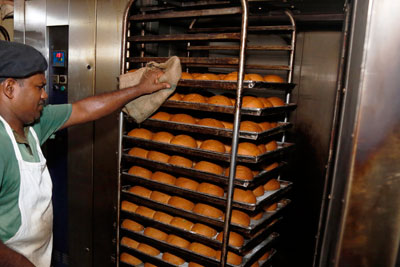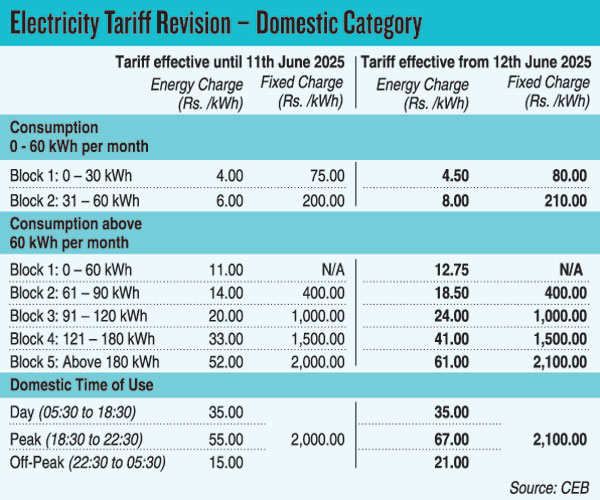News
Industrial sector hit hardest by electricity tariff hike; relief proposed
View(s):By Ishu Bandara
Although the electricity rate hike is affecting consumers across the board, the government needs to provide some relief to the industrial sector consumers, as the hike has had a significant impact on them compared to other sectors, according to Ceylon Electricity Board (CEB) Chairman Udayanga Hemapala.
He told the Sunday Timesthat the 15 per cent increase in electricity tariffs was having the greatest impact on large and medium-scale enterprises in the industrial, hotel, and general-purpose consumer sectors, rather than on domestic or other sector consumers.

Arumugam Nadaraja: Manager Colombo Victoria Bakery and Groceries Ltd
The tariff hike would amount to only a Rs. 240 increase in the bill for a domestic consumer using 90 units a month, and this might not affect their monthly expenses much, he said, while acknowledging that for some poor families, even a Rs. 50 hike could be burdensome.
“I believe the real impact of the 15% hike will be felt by hotels and industries, as their consumption levels are much higher. For instance, a business that previously had a Rs. 30,000 electricity bill might now face a bill of around Rs. 40,000. Therefore, I believe the government must step in and consider measures to support these sectors and help them manage the consequences of the increased costs,” he added.
He pointed out that the industrial sector’s electricity rate had already been subsidised with the revenue the CEB was earning from domestic consumers. “However, we plan to give greater consideration to the industrial sectors. For example, we are exploring the possibility of providing solar power solutions and assessing how the government can offer more targeted support going forward.”

Rajeshwari Rajarathnam: Resident of an apartment
Opposition political parties and consumer rights activists point out that the electricity tariff increase will trigger a hike in consumer prices.
When asked, Public Utilities Commission of Sri Lanka Director K.T.M. Udayanga Hemapala said, “When the government reduced electricity tariffs by 20%, we did not see a corresponding reduction in the prices of consumer goods. Therefore, it is unreasonable to increase consumer prices based on the latest tariff hike. The impact of electricity costs varies across different products, so it cannot be used as a blanket reason for price increases.”
On June 12, the Public Utilities Commission of Sri Lanka (PUCSL) approved a 15% electricity tariff increase across all consumer categories, effective immediately, following public consultations and a review of the CEB’s proposal. Household bills increased accordingly, starting at about an increase of Rs 20 for users consuming under 30 units and exceeding Rs 2,000 for those using over 300 units.
General-purpose consumers were slapped with a 14% hike, while industries and hotels saw a 15% increase. Government and state institutions faced a 16% rise. Religious and charitable institutions consuming less than 90 units were exempt from the hike, with existing subsidies and the fixed rate of Rs 4.50 per unit maintained.
When asked about the reason and basis for the recent electricity price hike, PUCSL’s Corporate Communications Director Jayanath Herath explained that the increase was driven by multiple factors.
He added that while the repayment of previously acquired international loans was one contributing factor, it was not the only reason behind the tariff increase. “It is caused by various elements such as fuel and coal prices, transition costs, distribution costs, loan repayments, loan interest, and other overheads. All of these factors are taken into account when preparing the proposal,” he said.
He pointed out that the CEB is a state-owned enterprise mandated to operate at a break-even point, “no losses, no profit”. This means the CEB does not generate profits or losses in the long term, ensuring that consumers are not being exploited. While the utility may experience profits or losses over short periods, these fluctuations are adjusted over time. For example, if the CEB earns a profit from June to December this year, that surplus should be returned to consumers during the same period next year.

Hard hit by recent hike: The bakery industry. Pix by M.A. Pushpa Kumara
He added that tariff calculations are strictly based on electricity generation, supply, and sales, in line with the provisions of the Electricity Act No. 20 of 2009. “We are bound to follow this Act. Entities like the IMF may express their views, but they have no authority to interfere with the tariff-setting process, which is governed solely by the procedures outlined in the legislation,” he said.
The Sunday Times also spoke to a cross-section of the people on the tariff hike. Here are some of their views:
Colombo’s Victoria Bakery and Groceries Ltd manager, Arumugam Nadaraja, who has been in the industry for over 54 years: “This increase has a significant impact on us, but we are not going to raise our prices because we value our long-term customers. We use a lot of electric equipment, such as bread-making machines, refrigerators, and fans. On average, we consume about 950 units a month, for which we pay Rs 110,000. With the 15% increase, our monthly bill will rise to nearly Rs. 126,000, which is a considerable burden.
Frequent electricity price hikes two to three times a year posed a serious challenge for both us and our customers. We can’t keep changing our prices every time tariffs go up, as it breaks the trust we’ve built with our customers. It would be better if the government carefully considered the impact before approving such frequent increases.”

Rajeshwari Rajarathnam and another resident of a Colombo 02 apartment: “The electricity tariff hike would significantly impact us, as we rely heavily on fans to cope with the heat in our apartments.” They also expressed frustration over the repeated increases, saying that such frequent hikes have broken their trust in the ruling authorities.
Sajith Perera, Managing Director of General Autos (Pvt) Ltd, known for its engine rebuilding services in Colombo: “This 15% increase is a serious blow to our industry. Since we operate in a competitive market, we can’t immediately pass the cost on to our clients, so we’re forced to absorb the loss ourselves. Price stabilisation takes at least three months.
“The company relies entirely on electricity to run its operations and has long served military sector contracts. Despite our contribution and the fact that we’ve consistently paid taxes and levies, we’ve hardly received any support from any government to sustain our industry. Just last month, on the 9th, we paid an electricity bill of Rs 158,000 for the 2,892 units we used. This increase will have a major impact on us.”
Mr Jayarathna, a representative of the Association of Small and Medium Enterprises in Sri Lanka: “The tariff hike directly impacts SME businesses like ours. We are expecting government involvement not only to address the electricity cost but also to support us in resolving other longstanding industry issues.
N.K. Jayawardana, President of the Bakery Owners’ Association: “We won’t increase our prices. We didn’t reduce prices when the electricity bill was lowered, so we won’t raise them now either.”
The best way to say that you found the home of your dreams is by finding it on Hitad.lk. We have listings for apartments for sale or rent in Sri Lanka, no matter what locale you're looking for! Whether you live in Colombo, Galle, Kandy, Matara, Jaffna and more - we've got them all!

